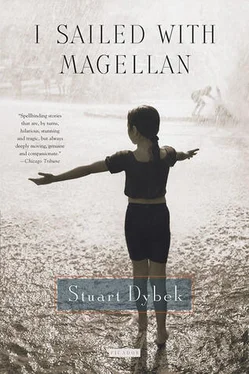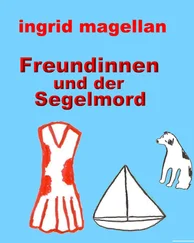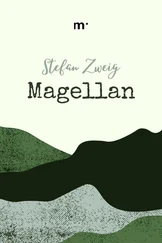“What’ll it be?” a gray-haired bartender with moles on his face and a German accent asked me, scooping up the tip from the man beside me who’d just left.
I inhaled as if considering, blew a cloud of smoke, and very deliberately stubbed out my cigarette in the ashtray on the bar.
“I’ll take one of those eggs,” I said, and went back to studying the market report.
He brought the egg, a plate for shells, a napkin, and salt and pepper shakers.
“Anything to drink?” he asked.
“Just a stein,” I said, without looking up from the paper.
I could feel him staring at me, not just with his eyes but with his moles as well, but he didn’t ask for my ID.
I peeled the egg, my hands steady, though I was sweating under the weight of the topcoat. I felt as if Uncle Lefty was at my shoulder like a guardian angel, as if instead of my abandoning him, his spirit had followed me out of the church and was here at the bar rather than transported off in a hearse running red lights, towing a line of funeral cars in a last ride down Milwaukee Avenue, way out to the Northwest Side, past the forest preserves, to the family plot in St. Adalbert Cemetery, a place that Lefty called the Old Polack Burial Ground. There would be a brief service at the graveside, that all-too-fertile-looking black rectangle gaping from a snow-clotted lawn. Then the living would retire to the White Eagle Restaurant, conveniently located across from the cemetery, for a huge spread of chicken, roast beef, kielbasa, kraut, pierogi, mashed potatoes, cucumbers in sour cream, and for dessert, platters of kolacky.
I salted and peppered my egg, applied a dab of horseradish from one of the bowls along the bar, and glanced up at my reflection in the gleaming mirror that ran the length of the bar. I watched myself loosen my tie. Already a plan was hatching: I’d finish the egg and order another, and with it another stein, then stand in line for a Thuringer sandwich on rye with a dill pickle. And for dessert, a boilermaker featuring a shot of Berghoff’s aged bourbon from one of the bottles reflected along the base of the mirror — a private toast to Uncle Lefty.
The bartender hammered a stein down before me, mopped the foam with his white apron, and I peeled off a couple crisp two-dollar bills and slapped them on the bar. He picked them up without batting an eye at the unusual bills and walked over to the register.
I raised the egg I’d dressed in pepper and horseradish to my mouth. It tasted better than anything I’d ever bit into before. Then I lifted the heavy stein, with its dark brew and beige head of foam, and took a swallow.
It was root beer.
“Everything okay?” the bartender asked when he returned with my change.
“Fine,” I said.
I finished the egg in another bite but left the root beer. When I was little and Uncle Lefty took me with him to neighborhood bars, root beer was what he’d always buy me.
“Excuse me,” I said to the bartender.
“Yah?” he asked as if we were speaking German.
“Do you have something to write with?”
He handed me the pencil from behind his ear.
“Thanks,” I said.
I slid the cardboard coaster emblazoned with the red Berghoff emblem out from under the stein of root beer, flipped it over, and on its blank side carved GO FUCK YOURSELF, and left it for a tip.
Outside, it had begun to snow, ticking grains that turned the afternoon as gray as a rainstorm would have. An icy wind off the lake funneled down Adams. I could hear the flags on the corner of State whipping the way my topcoat whipped around my knees. Instead of sticking, the snow blew off like grit, though behind display windows along State Street, sequined flakes suspended by threads gathered in cotton drifts around elves and reindeer.
On the other side of the expressway, downtown turned into blocks of pawnshops and strip bars displaying pictures of women in G-strings and pasties who were presumably disrobing inside. In the spirit of the season, some of the women were pictured wearing Santa hats. When Uncle Lefty took me pawnshopping with him, he’d blinder my eyes with his hands when we passed the strip bars, saying, “You’re too young yet.” Now, I was simply too cold. The streets that had seemed forbidden and exciting looked sleazy and dismal. I turned around and walked north back into downtown.
If not for the cold I could have kept walking. I wasn’t wearing a hat, and my ears burned numb. My hands felt raw from taking turns holding the topcoat closed at the throat, where it was missing a button. When I passed Marshall Field’s, I went in to get out of the cold.
The revolving door spun into a rush of steam heat and perfume, and I was drawn into a current of shoppers that led inevitably to the great Christmas tree at the center of a rotunda domed with Tiffany glass. To view the tree properly, you rode up the escalator, gaping over the edge to take in the lavish decorations — a dizzying sensation I recalled from childhood. A trip to Field’s, as my mother familiarly referred to the store, was a pilgrimage we made each holiday season. Instinctively, I followed the old route my mother and I would take to the toy department on the fifth floor. I wanted to see if the knights were still there. Until about sixth grade I’d obsessively collected them. They were miniatures made of metal, not plastic, imported from Europe and found only at Field’s. Their armor gleamed like newly minted nickel, their helmets had working visors that opened to reveal individual faces enameled with the intense expressions of combat. They swung broadswords, maces, battle-axes; some were jousters on armored steeds. I dreamed of amassing an army, but they were too expensive for me to acquire more than one or two each Christmas. At that rate, childhood would be over before I could marshal my forces. I wondered if I’d ever thought back then about stealing one. Probably not with my mother waiting patiently while I agonized over my choices. I wanted them all.
It was too late to buy them, even though I had Uncle Lefty’s wad of money. I wondered if there was anything in Field’s I wanted as much now. I began to browse, looking not for something to steal, exactly, but for something that I wanted enough to steal for. I rode the escalator as high as it went and worked my way down, drifting through aisles of furniture, crystal, china, clothing. I was back on the main floor, checking out jewelry, when I saw the woman at the perfume counter.
It was an impulse to take it. I had it in hand before I’d dared myself to do so; a flush of alarm at what I was doing shot through my body like an amphetamine. Beneath my topcoat the box of perfume felt pasted by sweat to where I’d pinned it between my arm and ribs. I backed away from the counter convinced that people were staring accusingly, yet it wasn’t getting caught that I was most worried about. In the instant during which I’d snatched the perfume, I’d lost sight of the woman in the crowd.
Jostling past shoppers laden with packages, I hurried along the aisle to catch up to her, trying not to look like a thief fleeing the scene of the crime. She had vanished. I stopped and surveyed the store, but picking her out of the milling crowd was impossible. Perhaps she was already riding the escalator up to women’s apparel. It seemed better to take a wild chance on finding her there than to stand paralyzed with a box of perfume under my coat. I turned for the escalator, and suddenly saw her straightening up from a drink at the water fountain.
After the panic of losing sight of her, simply to be following her through the store felt like incredible luck. She headed directly for the Washington Street exit, and I thought I could almost follow her by the scent of her perfume, although probably what I was smelling was the perfume that I’d blasted on my palm.
Читать дальше












